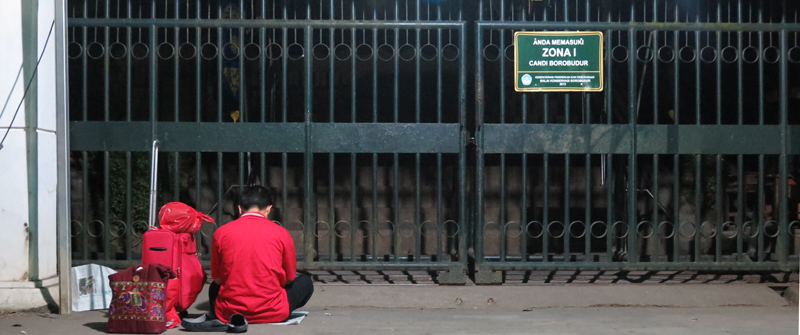
21 Jul Blog: Lonely at the top: 15 minutes of privacy at Borobudur
By Marieke Bloembergen
The road to Enlightenment is never easy, but for some people it is easier than for others. Last May I visited Borobudur. This giant eighth century Buddhist shrine and world heritage site is located in Indonesia where now the world’s largest Muslim population recently held the festivities marking the end of the fasting month.
But I was at Borobudur during Waisak when Buddhists all over the world celebrate another religion’s feast – the commemoration of the supreme Enlightenment and death of the Buddha. At the Borobudur site followers of the various Buddhist sects – both from within Indonesia and beyond– were praying at Buddha statues and listening to preachers. They gathered at the altars they had temporarily raised for the occasion, scattered over the terrain near the temple. Then I saw one man praying – alone, facing the temple and his prayers directed towards it. I found this logical, as Borobudur seemed, then and there, the crucial site. But the man was kept at least 300 metres away from the base of the temple, blocked by a gate. It was eleven o’clock at night and the temple was closed to public.
This solitary pilgrim brought to my mind the image of another lonely pilgrim. Five years earlier, in July 2011, the famous Hollywood actor, Buddhist and activist Richard Gere, during an afternoon when the temple was closed to public, got his ‘15 minutes of privacy’, to pray and meditate. Gere however, was allowed to do that on top of Borobudur, at the temple’s main stupa – alone.
The economics of heritage
‘Who cares?’ seems to be an apt reaction to these contrasting stories. For the religious performances they entail were not only the result of specific Indonesian heritage politics, but also a practical solution for private religious needs and choices. In both cases, the Indonesian government’s heritage law of 1992 set the conditions. This law categorises Borobudur officially as a ‘dead’ monument, which means that it can no longer be revitalised, transformed back to fulfil the functions for which it once was built. The presence of a Muslim majority population in Indonesia, since at least the sixteenth century, and today the world’s largest, reflects the historical change that has taken place. Today this heritage law implies that under special circumstances – like Waisak – religious rituals are possible, but subject to specific restrictions and rules. The regular Buddhist pilgrim is not allowed to pray on the temple. This is the exclusive privilege of celebrities and political leaders, like Gere in 2011, or Norodom Sihanouk, King of Cambodia, in 1984.
Karma or pecunia
Borobudur, as a world heritage site and like comparable sites anywhere else, is also a tourist attraction and therefore ‘money’– of interest to the state-owned company PT Taman Wisata Borobudur that runs Borobudur’s ticketing office. This however, was only to the advantage of Gere. His fame can enhance the image of Indonesia and the fate of Indonesian heritage tourism. To the press, Gere said it was karma that brought him to Borobudur after many years of longing: but PT Taman Wisata Borobudur invited him – so far the road to Enlightenment.
(Marieke Bloembergen is a cultural historian and senior researcher at KITLV. Her research interests concern the political dynamics of knowledge production, policing and heritage practices in colonial and postcolonial Indonesia, as understood in their local, inter-Asian and global dimensions.)




No Comments